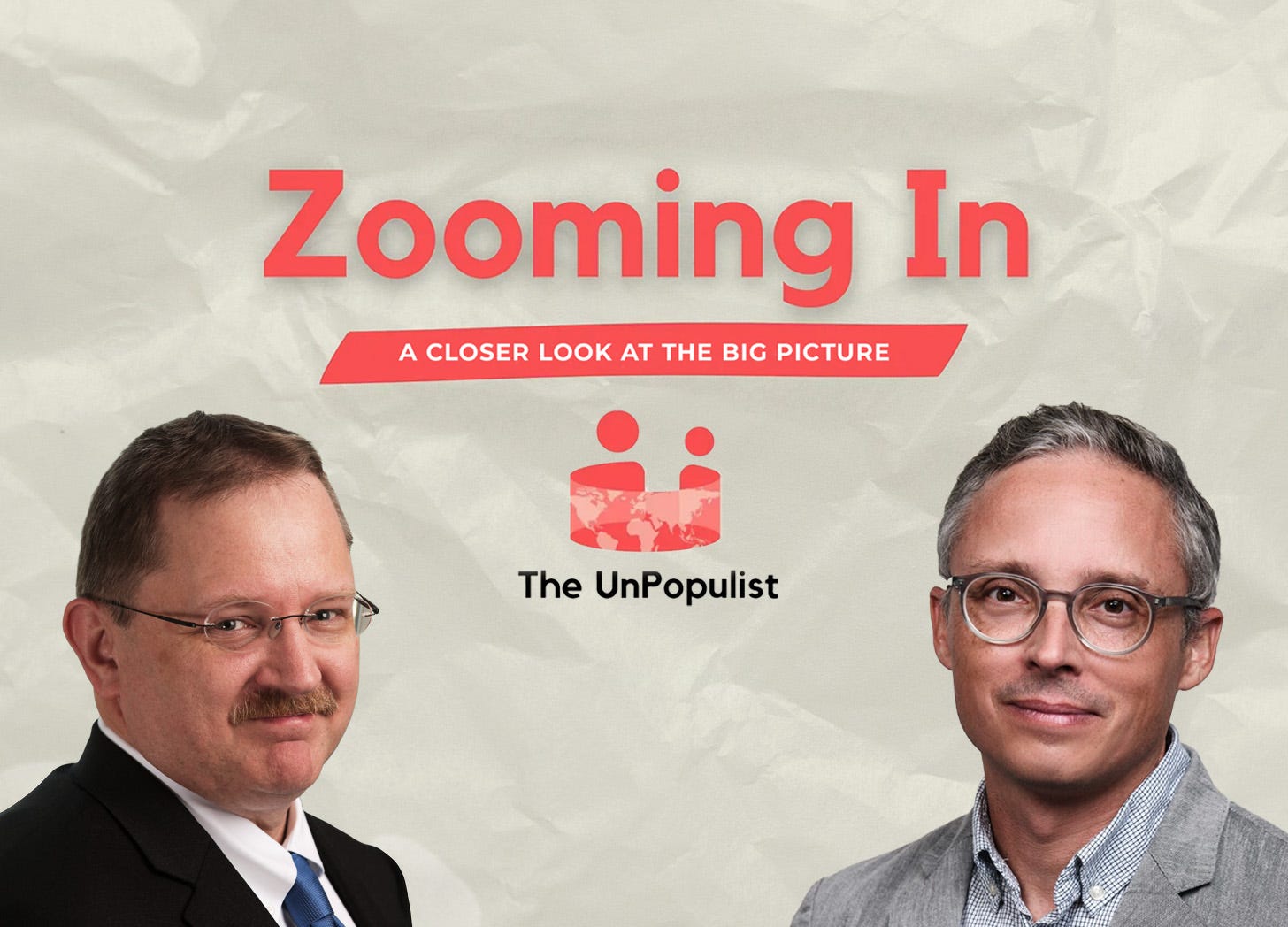Listen to Zooming In at The UnPopulist in your favorite podcast app: Apple Podcasts | Spotify | Google Podcasts | RSS | YouTube
Landry Ayres: Welcome back to Zooming In at The UnPopulist. I’m Landry Ayres.
For generations, the idea of American liberty has been synonymous with limited government and individual freedoms. Yet, since the Founding, the reach of state surveillance has grown exponentially, often shrouded in secrecy and justified by the need to fight threats to safety and security.
To explore the historic choices and institutional dynamics that paved the way for the modern surveillance apparatus, Aaron Ross Powell sits down with Patrick G. Eddington, senior fellow at the Cato Institute and author of the new book, The Triumph of Fear: Domestic Surveillance and Political Repression from McKinley to Eisenhower.
They discuss the long and often unsettling story of state surveillance in America, how it has led to a system susceptible to profound rights violations and political repression, and how actions—or inaction—by all three branches of government have allowed these capabilities to grow.
You will finding it interesting if deeply troubling.
A transcript of today’s podcast appears below. It has been edited for flow and clarity.
Aaron Ross Powell: How far back does state surveillance in the U.S. go?
Patrick Eddington: At least as early as the Civil War—and here I’m talking about intercepting telegraph-type communications, but also the use of human spies for gathering intelligence in a military context.
But you can go back even further to the pre-Civil War period, where we see the abolitionist movement really begin to gain steam from the 1830s onward, and you have active attempts by one or more administrations to use the Postal Service essentially to shut stuff down, intercepting abolitionist pamphlets and newspapers and those kinds of things. So, I would say, we could absolutely trace it back to that particular era.
But the reason that I subtitled the book, Domestic Surveillance and Political Repression, is because, more often than not, surveillance is a major enabler of repression. If, as an agent of the state, you target people for more than just keeping tabs on them, in order to really give you that edge and provide you with the information that you need—not just to target that person, but their associates and others—you need to gather as much data on them as you can: their associations, habits, patterns of life.
For the first several decades of the history of the Republic, the surveillance component of this would have been a male and/or human intelligence kind of surveillance. Of course, in the last 100+ years, it has really expanded heavily into the electronic arena. What we’re living with now, in terms of the scope of it, is insane.
Powell: I was going to ask about that—we obviously have a lot more surveillance of all of us now than we did at the Founding, and technology is a huge part of that. They can vacuum up metadata as the Snowden revelations showed years ago. Technology has enabled this. What I’m curious about is how much the growth in surveillance is the result of technology giving them the ability to do it versus them having reasons to want to do it more than they did before or giving into the urges to do it. So, was there always a kind of bottled up demand and then technology let them fulfill it? Or has the government become more keen on widespread surveillance over time?
Eddington: That’s a really good one. The argument that I make in the book is that the overarching mentality behind this is fear. Fear on the part of officials in government—both elected people and folks in the bureaucracy, whether at the Department of Justice or elsewhere.
Certainly, in the early 20th century, it was the fear of new and very powerful political ideologies that manifested first in Europe in the 1840s with those revolutions. In the decades that followed, socialism, communism, anarchism, and the rest of those ideas made their way across the Atlantic. I opened the book with a description of President McKinley being assassinated [in 1901] by a relatively recent anarchist convert. That is the beginning of folks in government feeling a need to really expand the power of the federal government to go into all these kinds of areas. And this is how we get the Anarchist Exclusion Act of 1903, where the government begins to try to use legislative and executive power to literally censor an entire idea.
Now, it was a nonsensical notion, of course, because newspapers, the telegraph, the telephone make it possible for ideas to spread in a very rapid manner. And in the aftermath of McKinley’s assassination, we don’t just get the Anarchist Exclusion Act, we begin to get a bona fide expansion of the actual human apparatus of surveillance. For most of the history of the country, you didn’t have an actual de facto national police force. The Secret Service was the first, and it was initially created to go after counterfeiters, but also to protect the president (and if personnel were available to the vice president and so on). But by the late 1890s, the Secret Service had gotten into the political surveillance business—a lot of this, of course, happening in the aftermath of the 1886 Haymarket incident in Chicago, which was blamed on anarchists, perhaps falsely, perhaps correctly.
What we got by the late 1890s was the Secret Service really getting into spying on anarchist cells on the East Coast, and particularly in the New York and New Jersey areas. Patterson, New Jersey, was very much a hotbed of anarchist activity. So you began to have at least some folks within the Secret Service develop an actual subject matter expertise in these groups. There was one particular Secret Service agent by the name of Moritz Hyman who was so successful at this that he was able to penetrate a number of anarchist cells and organizations, apparently without ever being detected. That was quite the feat, even back then. After the Secret Service gets involved in these things, [the organization grows].
President Theodore Roosevelt becomes a serial abuser of using the Secret Service to spy on his political opponents, whether they were Republicans or Democrats. He was very much an equal opportunity repressor in that respect. But Congress, the people that were targeted, as well as their colleagues in the House and Senate, never felt they could go after Roosevelt over his misuse of the Secret Service for fear of being labeled as corrupt, as Roosevelt was alleging, even though investigations of people like Sen. William Bohrer and others never produced any actual hard evidence that they were, in fact, on the take.
But it was a particular incident in late 1907 involving a Secret Service agent being detailed to the Secretary of the Navy to spy on a young man accused of having an extramarital affair that gives members of Congress the opening to go after Roosevelt. That was an incident whereby a Secret Service agent was used to spy on the personal life and habits of a particular individual. It did not remain secret. A news outlet got hold of it. It was publicized. And then in early 1908, the civil service appropriations bill prohibits the use of the Secret Service for anything other than protecting the president and going after counterfeiters.
“I can only think of two presidents, certainly in the last century, who were not in one way or another responsible for rights violations of American citizens. The first is Warren Harding, who actually lobbied Congress and was successful in getting the Sedition Act and the Food and Fuel Control Act repealed after the end of World War I. He did not manage to get the Espionage Act repealed, unfortunately, or the Trading with the Enemy Act. But Harding at least tried to move the country back in a more liberty-centric direction. And then the second is the late President Jimmy Carter, who, of course, passed away just within the last year. Carter comes into office literally just a year after the Church Committee published its findings about all of the excesses that had occurred in the 50 or so years prior. He signed the Foreign Intelligence Surveillance Act into law, which was supposed to prevent government surveillance overreach. He signed the Inspector General Act into law.” — Patrick Eddington
Now, this enraged Roosevelt. He did not veto the bill. Instead, he did an end run and went to his attorney general, Charles Bonaparte—who was, in fact, a distant relative of Napoleon Bonaparte—and told Bonaparte to create a fresh cadre of investigators out of whole cloth in the Department of Justice using general funds and put them to work doing exactly what those Secret Service agents had been doing. A number of Secret Service agents with experience in political investigations were hired by Bonaparte. By late 1908, this new creation called the Bureau of Investigation, what we today call the Federal Bureau of Investigation, was spying on socialists. By early 1909, it was spying on people in the press.
So it’s the infrastructure—the human and organizational infrastructure—that for the most part comes first. The reliance on technology comes with the First World War and the decades that followed.
Powell: Does the infrastructure then create a culture? Or does the professionalization create a culture? Let me see if I can tease this out.
One of the issues with cops in the U.S., and the reason cops are the way they are, is because when you’re a cop, you primarily hang out with other cops. You go to cop bars. You’re working with cops all day. You work in public policy in D.C., Pat. When I worked there as well, I’d hang out with policy analysts at happy hours. Everyone hangs out with their professional colleagues a lot. That’s not unique. But what happens is cops have a job where there are dangers involved—cops do get shot at, they do get attacked, bad things do happen to them in the line of duty—and you get to a point where the only other people who understand what it’s like are fellow police officers, which creates a more insular culture. And then you essentially talk yourselves into being more extreme. You don’t have the people who are like, “Wait a second. It’s actually more dangerous to be a roofer than it is to be a police officer. The vast majority of people are perfectly peaceful. You just happen to be seeing the ones who are having bad days.”
So it creates this culture, and then the culture creates an epistemic bubble where you discount the opinions or the critiques of people outside of it. And you’re just hyper-focused on a small set of things. People who work in medicine think that medical issues are the most important issues. People who work in housing policy think that housing policy is the most important thing. You become obsessed with your own profession, which is, again, another entirely natural thing. And so I wonder to what extent does that play out in surveillance—that it’s less about, “We want to surveil these people because we just want to oppress them,” and more that when you spend all day around people who are snooping in order to protect the Republic from threats, that’s the entire perspective you begin to see the world in. And then it becomes very easy for you to be persuaded, “Well, we need to use even more”—because you don’t have the check that you would if it wasn’t professionalized, if you weren’t spending all day in it.
Eddington: I don’t think there is any question that the policing profession creates an insularity and a bubble. If you were to go to any police academy class—I don’t care if it’s here in Fairfax County, Virginia, or out where you’re living in Denver, Colorado, or anywhere else—there is a very infamous video that every recruit is going to be shown. It’s called the Dinkheller video. It involves a young, relatively inexperienced officer who makes a stop and is trying to get this particular male individual to cooperate. And this individual is just determined to go well beyond any normal limits. And the young officer essentially lets this guy get the upper hand on him, and the video ends with the young officer being shot to death. I doubt there is any cop in the country who hasn’t seen that video.
By showing that video, without any other context about the larger life of policing, to borrow a term from Drew Westen, author of The Political Brain, that creates availability bias. It makes that young cop think, “Oh, my God, this is what I’m going to be facing every day on the street.” It’s not. That’s just not the case. But that’s the mentality that is created, and it is sustained in these academies. And then, after the young recruit gets out there, living in that bubble with all those other officers just reinforces all of that. The reality is policing in America is one of the safest professions in terms of annual fatalities that almost anybody can get into. But the police unions, especially the Border Patrol Union, would have you believe that every single cop is under continuous threat. And the data doesn’t bear it out.
This is a political problem as much as it is anything else. The problem is that with issues like this, it’s almost never about whether you have facts and reason on your side. It’s a question of emotion and perception. And even if those perceptions are completely skewed, it’s still what really drives things. What also drives things is the incentive structure. My wife and I have a young friend who just graduated from the Fairfax County Police Academy last year. He’s a great young man. And I can already see in my conversations with him some of these kinds of things creeping in. I think he’ll be stronger at resisting them because he’s a really smart young man. He has a level of self-awareness that most of his peers simply lack.
I’ve got another friend who is a federal law enforcement officer who I had dinner with over this past weekend, and during the course of our discussion, we got into a chat about the TSA’s [Transportation Security Administration] Quiet Skies program, which Homeland Security Secretary Kristi Noem claims has been shut down. The Quiet Skies program is one of those post-9/11 TSA airline passenger surveillance programs. The Boston Globe did a series of damning articles several years ago talking about the number of innocent Americans that got swept up in that program who were denied the right to travel. And, of course, it’s only after the current director of national intelligence, former Congresswoman Tulsi Gabbard, had complained very loudly about being on a Quiet Skies list that Noem finally took the action to shut the program down. What she did not shut down was the companion program called Silent Partner, which governs international air travel to and from the United States. So, if you are planning on traveling overseas to Europe, Asia, Australia, New Zealand, South America, your data may still be swept up in that particular program.
So we got into this discussion and my friend, the federal agent, started talking about the criteria. And I said, “Here’s the thing. You’re starting with the premise that every American who wants to board an airline is a potential terrorist.” “And,” I said, “that turns the entire concept of equal justice under law on its head. You’re treating that person as a threat first and a citizen a very, very distant second.” And I could see that they had that deer-in-headlights look, right? Like they were trying to escape, trying to figure out, “How do I get out of this?” But, in the end, they had to concede my point that the presumption behind this kind of program is that we’re all potential threats to begin with. So that institutional mentality, combined with these policies, combined with incentive structures, helps to drive this.
“The reality is policing in America is one of the safest professions in terms of annual fatalities that almost anybody can get into. But the police unions, especially the Border Patrol Union, would have you believe that every single cop is under continuous threat. And the data doesn’t bear it out.” — Patrick Eddington
Another example—a relatively recent example, but still a post-9-11 one—is the series of changes that were made to the attorney general’s guidelines for domestic FBI investigations in September of 2008. It was one of the last things that Attorney General Michael Mukasey did before walking out the door. He created an entirely new category of de facto investigations that the FBI could engage in. They’re called assessments. Under an assessment, an FBI agent can open a file on you, me, any organization, with absolutely no criminal predicate. They can search commercial and classified databases for information about us or any associations we might have. They can target us for physical surveillance. They can target confidential human source recruitments to try to get close to us. All of this without any kind of criminal predicate.
Now, if you stop and think about it, FBI agents, street cops, whatever, at the end of the day, how do they get promoted? How do they wind up potentially differentiating themselves from their colleagues? If there’s a specific set of internal criteria that takes you from, I’ll just use a federal government term, a GS-12 to a GS-13 in terms of pay and promotion potential, well, in the case of the FBI, part of that is, “How many assessments did you write? How many preliminary investigations did you open? How many full investigations did you open? How many enterprise level investigations did you open? How many times were you involved in a raid or an arrest?” It becomes a numbers game. And that was extremely true of the FBI under J. Edgar Hoover. He was a fanatic about statistics. Most of them were meaningless. Most of the stuff that they were gathering and trying to measure was ultimately meaningless. But it’s those incentive structures that help to drive it.
And then, finally, I can’t let us, the public, off the hook because the American public’s expectation of cops, as a general rule, is: get the bad guy, get the bad guy, get the bad guy. It’s not, first and foremost, protect rights, protect rights, protect rights. That’s just not the message that the average cop gets. So it’s a very toxic stew that’s been created here that helps to fuel all of this.
Powell: A few days ago, largely peaceful protests broke out in Los Angeles as ICE was attempting to kidnap innocent people. Thankfully, Americans seem to think that is still wrong and want to protect members of their community. The Trump administration has responded to this poorly and in ways that are likely unconstitutional, almost certainly illegal, and quite troubling from the perspective of the future of American democracy, basic civil liberties, and just liberty in general. You and I had booked this recording before all of this went down. And I suggested, “Do we want to pivot to talk about what’s happening in Los Angeles because you were covering it?” And you thought it was worth talking about both your book and this in relation to each other. So let’s do that.
Your book, I think, is the first that I have liked enough to have the top blurb on the back cover. So it has my formal written endorsement. Why did you want to talk about both your book and what’s happening in Los Angeles today?
Eddington: Well, we are where we are right now, in no small measure, because of the excesses, the rights violations, the usurpations of the Constitution and other applicable statutes, that pretty much all of Trump’s predecessors have engaged in over the course of the history of the Republic. You know, Aaron, as I was thinking about what we were going to be talking about today and what I’d have to say about it, I can only think of two presidents, certainly in the last century, who were not in one way or another responsible for rights violations of American citizens. The first is Warren Harding, who actually lobbied Congress and was successful in getting the Sedition Act and the Food and Fuel Control Act repealed after the end of World War I. He did not manage to get the Espionage Act repealed, unfortunately, or the Trading with the Enemy Act. But Harding at least tried to move the country back in a more liberty-centric direction.
And then the second is the late President Jimmy Carter, who, of course, passed away just within the last year. Carter comes into office literally just a year after the Church Committee published its findings about all of the excesses that had occurred in the 50 or so years prior. He signed the Foreign Intelligence Surveillance Act into law, which was supposed to prevent government surveillance overreach. He signed the Inspector General Act into law.
This is also the period in which the House and Senate Intelligence Committees were created. What we have seen over the course of the last four decades is the House and Senate Intelligence Committees mutate from being overseers of the intelligence community and federal law enforcement into cheerleaders. We have seen FISA be radically misused. Thousands of Americans having their data scooped up. Political candidates actually having their donors targeted—in the case of one particular House member, 19,000 some odd donors.
And then enter Donald Trump, who, now in office less than six months, has effectively obliterated most of the Inspector General class in Washington, essentially making the Inspector General Act meaningless. That’s one of the reasons why the history that I’ve chronicled—and I’m hardly the only one to have chronicled slices of this history—is so incredibly important. Because the failure of our system, the failure of members of Congress, particularly the courts—the courts have been huge enablers of surveillance and police power in general—the failure of our system to correct in a meaningful way and help prevent these kinds of abuses is why we are where we are now.
Donald Trump was very much at sea during his first term. He was flailing around, trying to figure out what to do. This time around, he’s actually got a couple of people in his inner circle who know what they’re doing. And the two guys at the top of that list, of course, are his shadow, Stephen Miller, who is clearly a white supremacist, in my judgment, and Russell Vought, who was his director of the Office of Management and Budget the first time around, but who came in with a real game plan this time to basically gut most of the federal bureaucracy, particularly over at the Department of Justice and especially at the Federal Bureau of Investigation, in a very clear effort to completely politicize the entire law enforcement apparatus of the federal government to act as nothing more than Trump’s own personal police force.
It’s because of all of the failures of the last 60 years to learn from those other overreaches by Trump’s predecessors, and the failure to properly put into place really meaningful reforms that would make it impossible for something like this to happen, that we are where we are.
Powell: If, and this is a huge if, we make it through this—meaning American democracy survives the next three and a half years and we’re able to put Trump and Trumpism in the rearview mirror—does what we’re seeing now, the level of abuse that is impossible to ignore because they’re so open about it and so open in their lawlessness and in their willingness to point out that the guardrails weren’t really there, that the guardrails that existed before were mere conventions that they could just step over or around or break through ... does that mean we are likely to see a renewed effort at meaningful reform in the same way that the Church Committee happened because there were egregious abuses and Frank Church decided to do something about it? He was able to bring together enough political will to make reforms that did have meaningful effects for a time, even if they weren’t perfect and didn’t last. Do you think we’ll see something like another Church Committee, another round of meaningful reforms given how bad things are now?
Eddington: We already see some glimmers of that. I had a recent piece in The Bulwark talking specifically about what needs to come after. People right now appear to be in the early stages of recognizing that we cannot go back to the kind of system we had previously. Sen. Cory Booker of New Jersey and Rep. Jamie Raskin of Maryland appear to be the two guys right now who get this—and I say that because a couple of weeks ago they introduced identical bills in the House and Senate to move the United States Marshal Service out of the executive branch, move it out of the Department of Justice completely, and put it under the control of the federal judiciary. This is a response to the almost daily attacks by the president—and especially his other mouthpieces, his other amplifiers and enablers—on the federal judiciary and on specific judges. It’s a great start and that’s what I said in The Bulwark—but in the end folks are going to have to realize we have to go much further than that.
I see two pathways to achieve that. My ideal pathway would be a constitutional amendment that would take the entire Department of Justice and all federal law enforcement pretty much out of the presidency and would get the presidency out of domestic law enforcement forever. That’s a heavier lift to say the least—particularly in a highly politicized environment. Very, very difficult.
“The Republic is worth fighting for. … I tell this to anybody who will listen, when you really stop and think about it, America is a miracle. It’s a miracle that we were able to achieve our independence from the United Kingdom with a little bit of help from the French government. We beat back a de facto attempted reconquest between 1812 and 1815. We survived our bloodiest war to date, the Civil War. We won two world wars. We won the Cold War. Americans invented the light bulb, the airplane, and I’m pretty sure the personal computer. So it really has been an amazing country, despite all these terrible things that I and others have chronicled. And that’s why I still believe it’s absolutely a country and a Republic worth saving. And it’s up to each of us, essentially, to do what we can to that end.” — Patrick Eddington
My Cato colleague Mike Fox has suggested that there is another pathway—one that would not actually require a constitutional amendment and that would be simply downsizing the Department of Justice and cabining what it can do down to a very narrow set of actual law enforcement tasks. This is probably the easier lift—but, still, in this hyper-partisan environment, this hyper-polarized environment in which, to borrow a line from season two of Andor in which some people’s grasp on objective reality has vanished, has been ripped from their hands or they’ve just simply been willing to let it go, we’re going to have to get to a place where that is simply not the case with a lot of folks in the House and Senate, whether we’re talking about the existing composition of the House and Senate or folks to come.
But any kind of effort to rein in this coercive, corrosive surveillance and law enforcement power is going to require an awful lot of people to completely readjust their thinking about the nature of policing and those kinds of powers in America. This fascination with police and this near reverence for police, certainly among the white majority, is extremely embedded in the culture and in people’s mindsets. And that’s going to be a tough one.
But we don’t have any choice but to try because, in my lifetime, I have seen two presidents of the United States now successfully subvert the Constitution to meet their political ends. Richard Nixon, if he had not had inept burglars at the Watergate, might well have gotten away with it completely. His campaign was a political version of the FBI’s COINTELPRO. That’s literally what it was. Watergate was just the tip of the iceberg. And what Woodward and Bernstein found, in the course of their investigation, was that that entire campaign started a year before Watergate. It was designed, essentially, to take out the Democrat most likely to have a chance of beating Richard Nixon and instead let Nixon face somebody who would inevitably be less popular with the American people. And that, of course, is exactly the outcome that Nixon got.
Now we have Trump, who attempted to overthrow the government between Nov. 5th, 2020 and Jan. 6th, 2021, who now has returned to power and is using it on steroids.
So I guess the way I look at it, Aaron, is if enough people don’t learn the lesson from this and understand that fundamental structural reform, ideally of a constitutional nature, to sharply restrict what a president can actually do in a domestic context, and specifically that the president should have no role, and the executive branch should have no role at all, in domestic law enforcement ... even if we survive this, if the reforms are anemic, if they are inadequate, some other demagogue may well come down the road 20 years from now, 50 years from now, maybe long after you and I are gone, and really, truly succeed where Trump may ultimately fail.
I think the silver lining that we may have right now, at least in part—and you’ve actually talked about this previously—is the very unstable, fractious nature of this coalition that Trump has put together. At the macro level, we have seen that now with the falling out between Musk and Trump, and how a lot of Trump’s mouthpieces, both in the administration and outside the administration, are now turning their knives, their rhetorical ones at least, on Musk. If I were a real cynic, I’d say we ought to be doing everything we can to foster that kind of division. Because I think, in the end, that’s part of the solution to actually getting Trump out of power.
So I guess my overall message to people is, the Republic is worth fighting for. And it’s always important to remember, and I tell this to anybody who will listen, when you really stop and think about it, America is a miracle. It’s a miracle that we were able to achieve our independence from the United Kingdom with a little bit of help from the French government. We beat back a de facto attempted reconquest between 1812 and 1815. We survived our bloodiest war to date, the Civil War. We won two world wars. We won the Cold War. Americans invented the light bulb, the airplane, and I’m pretty sure the personal computer. So it really has been an amazing country, despite all these terrible things that I and others have chronicled. And that’s why I still believe it’s absolutely a country and a Republic worth saving. And it’s up to each of us, essentially, to do what we can to that end.
© The UnPopulist, 2025
Follow us on Bluesky, Threads, YouTube, TikTok, Facebook, Instagram, and X.
We welcome your reactions and replies. Please adhere to our comments policy.


















